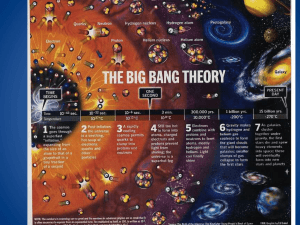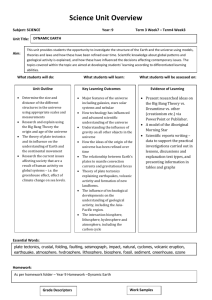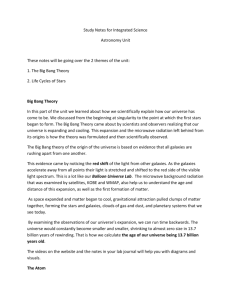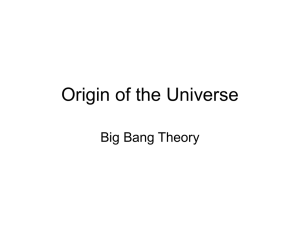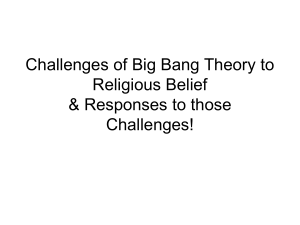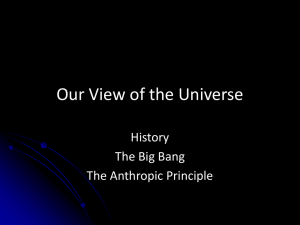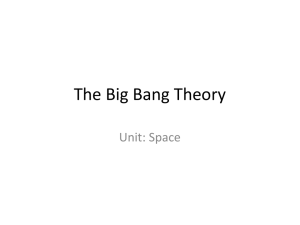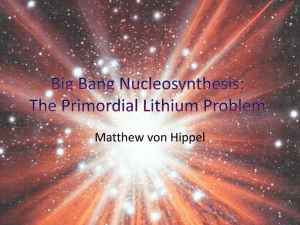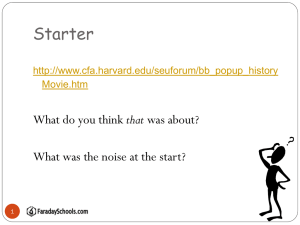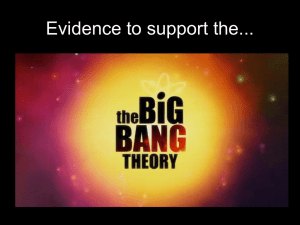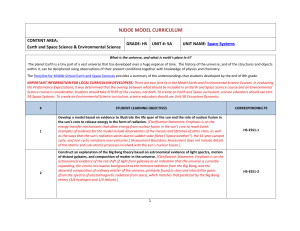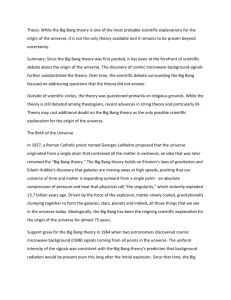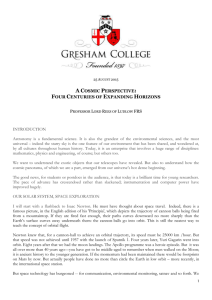Unit planner Term 4 2015
advertisement
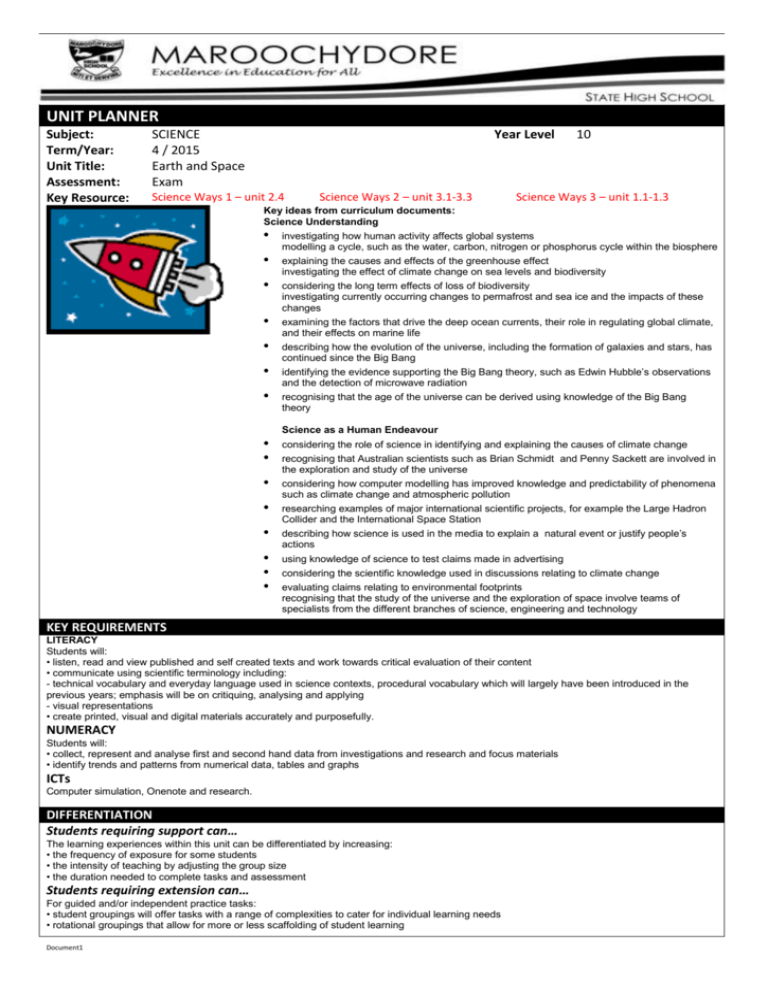
UNIT PLANNER Subject: Term/Year: Unit Title: Assessment: Key Resource: SCIENCE 4 / 2015 Earth and Space Exam Year Level Science Ways 1 – unit 2.4 Science Ways 2 – unit 3.1-3.3 10 Science Ways 3 – unit 1.1-1.3 Key ideas from curriculum documents: Science Understanding • • • • • • • investigating how human activity affects global systems modelling a cycle, such as the water, carbon, nitrogen or phosphorus cycle within the biosphere explaining the causes and effects of the greenhouse effect investigating the effect of climate change on sea levels and biodiversity considering the long term effects of loss of biodiversity investigating currently occurring changes to permafrost and sea ice and the impacts of these changes examining the factors that drive the deep ocean currents, their role in regulating global climate, and their effects on marine life describing how the evolution of the universe, including the formation of galaxies and stars, has continued since the Big Bang identifying the evidence supporting the Big Bang theory, such as Edwin Hubble’s observations and the detection of microwave radiation recognising that the age of the universe can be derived using knowledge of the Big Bang theory Science as a Human Endeavour • • • • • • • • considering the role of science in identifying and explaining the causes of climate change recognising that Australian scientists such as Brian Schmidt and Penny Sackett are involved in the exploration and study of the universe considering how computer modelling has improved knowledge and predictability of phenomena such as climate change and atmospheric pollution researching examples of major international scientific projects, for example the Large Hadron Collider and the International Space Station describing how science is used in the media to explain a natural event or justify people’s actions using knowledge of science to test claims made in advertising considering the scientific knowledge used in discussions relating to climate change evaluating claims relating to environmental footprints recognising that the study of the universe and the exploration of space involve teams of specialists from the different branches of science, engineering and technology KEY REQUIREMENTS LITERACY Students will: • listen, read and view published and self created texts and work towards critical evaluation of their content • communicate using scientific terminology including: - technical vocabulary and everyday language used in science contexts, procedural vocabulary which will largely have been introduced in the previous years; emphasis will be on critiquing, analysing and applying - visual representations • create printed, visual and digital materials accurately and purposefully. NUMERACY Students will: • collect, represent and analyse first and second hand data from investigations and research and focus materials • identify trends and patterns from numerical data, tables and graphs ICTs Computer simulation, Onenote and research. DIFFERENTIATION Students requiring support can… The learning experiences within this unit can be differentiated by increasing: • the frequency of exposure for some students • the intensity of teaching by adjusting the group size • the duration needed to complete tasks and assessment Students requiring extension can… For guided and/or independent practice tasks: • student groupings will offer tasks with a range of complexities to cater for individual learning needs • rotational groupings that allow for more or less scaffolding of student learning Document1 Term 4 WK 1 2015 Lesson 1 Lesson 2 Lesson 3 Discovering the lithosphere • Examine the structure of the lithosphere and describe the use of the surface of the lithosphere. • Discuss the effects of changes to the lithosphere. Discovering the atmosphere • Explore the structure of the atmosphere. • Define weather and climate. • Discuss the influence of the atmosphere on other systems. Discovering the hydrosphere • Explain the composition of the hydrosphere and describe the distribution of fresh and salt water on the planet. • Discuss the influence of ocean currents on global systems. Discovering the biosphere • Explain the composition of the biosphere. • Identify the interconnectivity of the systems. • Describe the influencing factors on habitats and biodiversity. 2 3 Analysing the flow of carbon • Explain the importance and structure of the carbon cycle in nature. • Explain the carbon cycle's influence on the planet. Greenhouse Effect and Global Warming • Explain the greenhouse effect and define global warming and climate change. • Examine data on climate change and identify changes to the global systems. Analysing changes to water distribution • Revise the water cycle, Draw a diagram of the water cycle and describe the changing conditions of water use and availability. • Discuss the impact of climate change on water resources. Analysing changes to nutrient cycles • Outline the nitrogen and phosphorus cycles. • Discuss how humans have influenced the cycles. Evaluating the effect of change on the biosphere • Explain current ecosystems and examine current research on biodiversity and its importance. • Discuss the impact of human influence on biodiversity 4 5 6 7 Discovering the universe • Definitions and examples of planets, stars, constellations, galaxies and nebulae. • Relative sizes of, and distances between planets, stars and galaxies • Explore the shape and composition of the universe. • Use appropriate scales to describe the distances between celestial bodies. • Describe our Sun as a Star, explain how nuclear fusion to generate heat and light, sunspots Observing changes in the universe • Examine the life cycles of stars • Identify time scales over which star changes occur • Explain that the colour of stars depends on temperature • Supernovas and Black Holes Examining the Big Bang theory • Outline the Big Bang theory and the calculated age of universe • Explain red shift and how it supports Big Bang theory • Explain CMBR and how it supports Big Bang theory REVISION 8 Critical Learning Lesson EXAM Literacy Focus Numeracy Focus ICT lesson Creative Thinking Practical Lesson Key Words lithosphere Carbon cycle universe Document1 atmosphere Phosphorus cycle Big bang theory biosphere Nitrogen cycle galaxies hydrosphere Global warming planets biodiversity stars Human impacts
